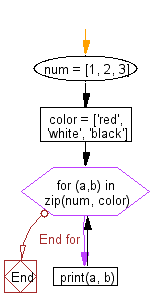

Below is an implementation of the zip function and itertools.izip which iterates over 3 lists: Python3. Python’s future module has much stuff already done in an optimized way. Note: Python’s future library ensures compatibility with Python 2.6/2.7 and 3.x versions. It is a python 2 version feature and got omitted in the Python 3 versions. This works exactly like you’d expect, meaning you just only need to pass in the lists as different arguments. In simple words, it runs till the smallest of all the lists. eritems () This function returns an iterator of the dictionary’s list. The Python zip () function makes it easy to also zip more than two lists. zip () function stops when anyone of the list of all the lists gets exhausted.

This function creates an iterator that aggregates elements from each of the iterables.

In these situations, consider using itertools.izip(iterables) instead. The iteration ends with a StopIteration exception once the shortest input iterable is exhausted. This object yields tuples on demand and can be traversed only once. This will run through the iterator and return a list of tuples. In Python 3, however, zip () returns an iterator. Python Dictionaries Access Items Change Items Add Items Remove Items Loop Dictionaries Copy Dictionaries Nested Dictionaries Dictionary Methods Dictionary Exercise Python If.Else Python While Loops Python For Loops Python Functions Python Lambda Python Arrays Python Classes/Objects Python Inheritance Python Iterators Python Scope Python Modules Python Dates Python Math Python JSON Python RegEx Python PIP Python Try. We can iterate over lists simultaneously in ways: zip () : In Python 3, zip returns an iterator. In Python 3, you can also emulate the Python 2 behavior of zip() by wrapping the returned iterator in a call to list().


 0 kommentar(er)
0 kommentar(er)
